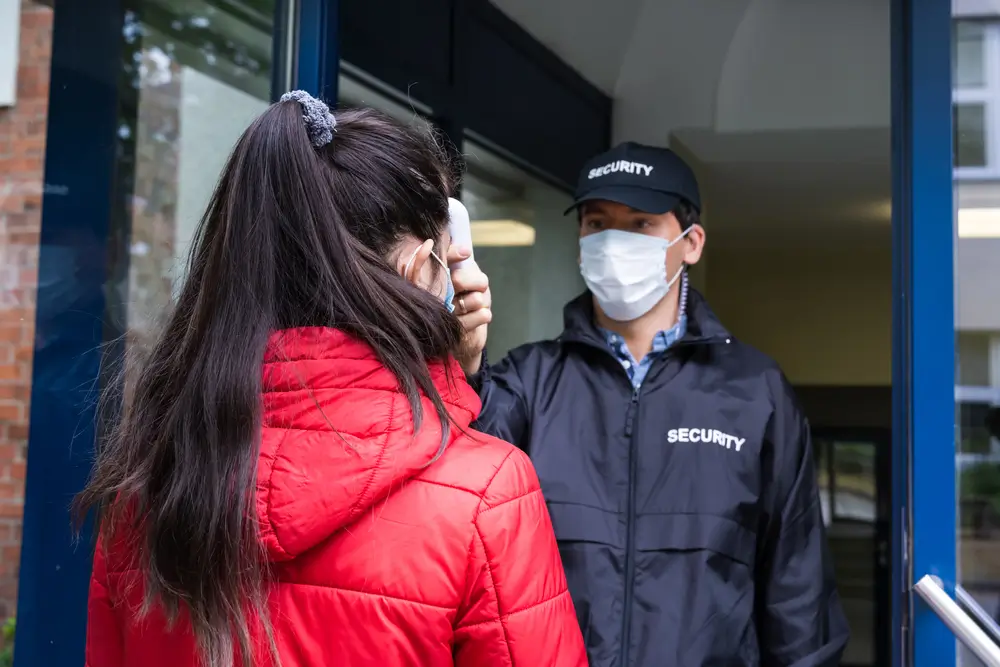When you think of a hospital, security might not be the first thing that comes to mind. However, ensuring a safe and secure environment is crucial for patients, staff, and visitors. Hospital security involves a lot of security protocols that work in tandem with different other forces to ensure the safety of everyone.
Key Takeaways
- Hospital security is crucial for protecting patients, staff, and sensitive information from potential threats.
- Security measures safeguard against violence, theft, and unauthorized access, ensuring a safe environment for patient care.
- Security protocols are essential for handling emergencies effectively and maintaining regulatory compliance.
Why is Hospital Security Important?
Hospital security plays a crucial role in maintaining a safe and secure environment for everyone within the healthcare facility. Here’s why it’s so important:
Protecting Patients and Staff
Hospital security measures help protect patients, visitors, and healthcare staff from potential threats such as violence, theft, or unauthorized access. By maintaining a secure environment, hospitals can ensure that patients receive care without fear or disruption, while staff can perform their duties with confidence.
Safeguarding Sensitive Information
Hospitals store sensitive patient information, including medical records and personal data. Adequate security measures are essential to protect this information from unauthorized access or breaches, safeguarding patient privacy and confidentiality.
Preventing Crime and Violence
Hospitals can be vulnerable to various security threats, including incidents of crime, violence, or disturbances. Effective security measures help deter criminal activity and ensure prompt response to any emergencies that may arise.
Enhancing Emergency Preparedness
Hospital security protocols are crucial for emergency preparedness and response. Security guards are trained to handle various emergency situations, including natural disasters, medical emergencies, or security breaches, ensuring a coordinated and effective response.
The Impact of Hospital Security
Hospital security not only ensures the physical safety of patients and staff but also contributes to the overall well-being and efficiency of healthcare operations. Consider the following aspects:
- A secure and safe environment fosters trust and confidence among patients, improving their overall experience during hospital visits or stays.
- Healthcare professionals can focus on delivering quality care when they feel safe and supported in their work environment, leading to higher job satisfaction and morale.
- Hospitals are required to comply with various regulations and standards related to security and safety. Implementing robust security measures helps hospitals meet these requirements and avoid potential legal or regulatory issues.
How Hospital Security Reduces Risk
When we think about a hospital, its primary role is to be a safe haven for healing and recovery. But how do hospitals ensure this safety? A key element is their security system, which plays a crucial role in reducing risks, preventing unauthorized access, and ensuring the overall well-being of patients, staff, and visitors. Let’s delve into the various components of hospital security and understand their significance.
Security Guards
The presence of security guards in hospitals is not just for show; they are the front line of protection. These guards are trained to handle a range of situations – from guiding visitors to managing emergencies. They keep an eye on the comings and goings, ensuring that only those who should be there are present. Their presence alone can be a deterrent to potential troublemakers. Beyond this, they are often the first responders in case of medical emergencies or security incidents, bridging the gap until additional help arrives.
CCTV/Alarm Monitoring
CCTV cameras and alarm systems are the eyes and ears of the hospital when human vigilance is not enough. These systems provide continuous surveillance, helping to monitor and record activities in various parts of the hospital. They are particularly useful in remote or less frequented areas, where immediate human response might be limited. CCTV footage can be critical in investigating incidents, and alarm systems can alert staff to potential security breaches, ensuring that help is dispatched promptly.
Access Control
Hospitals are full of sensitive areas – from newborn units to pharmaceutical storage rooms. Access control systems ensure that only authorized personnel can enter these areas. These systems can range from keycards to biometric scanners, offering varying levels of security depending on the sensitivity of the location. This not only protects patients and sensitive data but also ensures that staff can work without the fear of unauthorized intrusions or disturbances.
Background Checks
Finally, the importance of conducting thorough background checks on hospital staff cannot be overstated. These checks are crucial for ensuring that those who care for the vulnerable are themselves trustworthy. This is especially important in a setting where staff have access to a variety of medications and sensitive patient information. Background checks act as a preventive measure, helping to maintain a safe and secure environment for everyone in the hospital.
Each of these components plays a vital role in the overarching security system of a hospital. Together, they create a safe and secure environment, allowing patients to focus on what’s most important: their health and recovery.
Tips for Enhancing Hospital Security
- Staff Training: Regular training on security protocols is essential.
- Visitor Check-In: Implement a visitor management system for better tracking.
- Emergency Drills: Conduct regular drills to ensure preparedness.
Closing Thoughts
Hospital security is of utmost importance for ensuring the safety, privacy, and well-being of patients, staff, and visitors. By prioritizing security measures and investing in security guards, technology, and protocols, hospitals can create a safe and supportive environment where quality healthcare can thrive.
Hire Walton security guards for your hospital security.
You can reach us | By Phone | 03 9028 8098
Website | www.waltonsecurity.com.au and you can chat to us from here
Email | info@waltonsecurity.com.au





